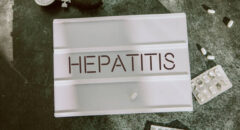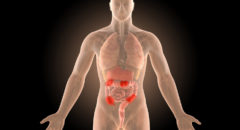
Blacks are more likely to develop liver disease than any other race. If you've been diagnosed with hepatitis C, there is plenty you can do to stay healthy and lower your risk of developing serious liver disease. Like many diseases, hepatitis C is affected by the way we live -- what we eat, how much we exercise, even how we deal with stress. The healthier you are overall, the better your body can deal with the virus. The less strain you put on your liver, the healthier it will remain.
That doesn't mean you can get rid of the virus by living right or that people who develop serious liver disease as a result of HCV did something wrong and are somehow responsible. Many factors combine to determine the course of the disease. Here are the six most important steps to protecting your liver:
1. Eat well
Most of the substances we ingest eventually find their way to the liver. Part of its job is to remove toxins and metabolize substances for use by the body. So it makes good sense that eating a healthy diet will help keep your liver strong.
Most of the advice is valid whether you're infected with HCV or not. The Centers for Disease Control and Prevention guidelines recommend eating a well-balanced, low-fat diet. A well-balanced diet includes plenty of fruits and vegetables (five to nine servings a day), whole-grain breads and cereals, and lower-fat sources of protein, such as lean meats. Saturated fat, the kind found in meat and dairy products, has been shown to clog arteries and lead to cardiovascular disease.
Lately, scientists have discovered that trans fats (also called hydrogenated fats) may be just as bad or worse for the arteries. And some experts believe that these artificially made fats may be especially difficult for the liver to metabolize. To reduce your intake of trans fats, cut back on processed foods, which are the main source of trans fats. Examples include chips, cookies, and crackers.
Another important aspect of a healthy diet is eating just enough to maintain a healthy weight. Doctors are alarmed at the expanding waistlines of Americans: Overweight and obesity have been linked to a long list of health problems, including diabetes and heart disease. There is some evidence that if you're HCV-positive and overweight, shedding some pounds could help your liver.
A study reported in the American Journal of Clinical Nutrition put 19 overweight people with hepatitis C on a 12-week diet and exercise program. The participants lost 13 pounds on average, about a pound a week. At the same time, several markers of liver health improved, including liver enzymes and the amount of scar tissue and fat in the liver.
RELATED: Can You Get Hepatitis From Drinking Alcohol?
2. Avoid alcohol
People with hepatitis C should eliminate alcohol from their diet, according to the Centers for Disease Control and Prevention. Several studies have shown that among people with hepatitis C, regular drinkers have higher levels of the virus than do non-drinkers. Studies also show that when people with HCV infection stop drinking alcohol, their virus levels decrease.
Recently, experts figured out why. In an experiment directed by Wen-Zhe Ho, MD, director of retroviral research at Children's Hospital of Philadelphia, researchers discovered that alcohol causes hepatitis C viruses to multiply in the liver. The findings, reported in the journal Hepatology, show that alcohol increases the activity of a protein that triggers HCV to make new copies of itself. These new copies speed the progress of the infection and raise the risk of liver damage.
Some experts still debate whether it's safe for people with HCV to drink small amounts of alcohol -- a glass of wine or beer a day, for instance. Several studies suggest that the biggest danger comes from excessive intake. But other research has shown that even small amounts of alcohol can put a strain on the liver and increase the risk of damage. For advice on what's right for you, talk to your doctor. If you have a problem with alcohol, or if someone you know needs help, you can find out about local treatment programs in your community by calling the National Drug and Alcohol Treatment Referral Routing Service at 1-800-662-HELP.
RELATED: Top Signs You May Be Dealing With Liver Failure
3. If you smoke, make a plan to quit
Tobacco is well known to increase the risk of many cancers, of course. But the toxins in cigarette smoke can also harm the liver. Studies have shown that people with hepatitis who smoke run an increased risk of developing both cirrhosis of the liver and liver cancer. A study by researchers at the Nagoya City University Medical School in Japan found that habitual smoking more than doubled the risk of liver cancer among people infected with HCV. A study by French researchers showed that smoking also dramatically increases the risk of cirrhosis.
It's easy to advise someone to quit smoking, of course -- it's much harder to quit. Quitting may be especially difficult for anyone who is being asked to make other lifestyle changes, such as giving up alcohol and other drugs. The stress of dealing with hepatitis C can also make it hard to stop smoking. But many people do successfully quit. Nicotine patches, gum, and other aids can make it easier. Support groups are available in many communities.
4. Stay active
There is no direct evidence that physical activity helps battle hepatitis C viruses. But there is good reason to think that regular moderate exercise keeps the immune system in good working order. Regular exercise also keeps the heart strong and the cardiovascular system robust, which is important to overall good health. What's more, regular exercise helps many people relieve stress and feel better about themselves. That's particularly important when you're dealing with a medical condition like hepatitis C.
Even patients who have received liver transplants, new research shows, can benefit from moderate activity. A study by researchers at the University of California at San Francisco found that liver transplant recipients who participated in regular physical activity enjoyed a higher quality of life.
RELATED: Can Stress Worsen Hepatitis C?
5. Relax and recharge
One of the biggest complaints for people with HCV infection is fatigue. When you're feeling wiped out, it's important to relax and recharge your energy. It's not always easy to find time for this if you have a lot of demands on you. But taking just 15 minutes to sit quietly and relax can make a big difference in how you feel. Another useful way to relax is to do something that you love: reading, listening to music, talking to a close friend, pursuing a favorite activity.
Taking time out to relax can also help you ease the inevitable stresses that come from dealing with a health problem like hepatitis C. There is no direct evidence that stress worsens the prognosis for people with HCV, but there is plenty of evidence that stress can weaken the immune system. Stress can also take the joy out of life, so it's important to find ways to relax and let off steam.
6. Talk to your doctor before starting any pills, including vitamins or supplements.
Many medications and other substances are processed and broken down by the liver. But some of them can be toxic to this hard-working organ. In fact, drug-induced liver injury is now the leading cause of acute liver failure in the United States, more common than all other causes combined. (One of the biggest offenders is acetaminophen, or Tylenol, especially when the people take more than the recommended dose.) Nearly 1,000 drugs are believed to harm the liver, including over-the-counter drugs, some vitamin and mineral supplements, prescription drugs, illicit recreational drugs, and even herbal remedies. The FDA has issued warnings about liver toxicity associated with kava kava, for instance. Ephedra, mistletoe, and comfrey have also been associated with liver toxicity.
All these substances can be especially harmful if you have chronic hepatitis C. Because of the infection, you may have abnormally low levels of certain enzymes that are needed to break down toxins. Or you may have impaired blood flow, which means substances will remain in the liver longer than normal.
The list of potentially harmful drugs, medications, and supplements is long and constantly being updated, so don't take any pills or potions before talking to your health care provider. Make sure your doctor is aware of all medications, over-the-counter drugs, supplements, or herbal remedies you are currently taking.
Living a healthy lifestyle can keep you stronger and better able to deal with the effects of the hepatitis C and treatment. A healthy lifestyle can also improve the overall quality of your life.









